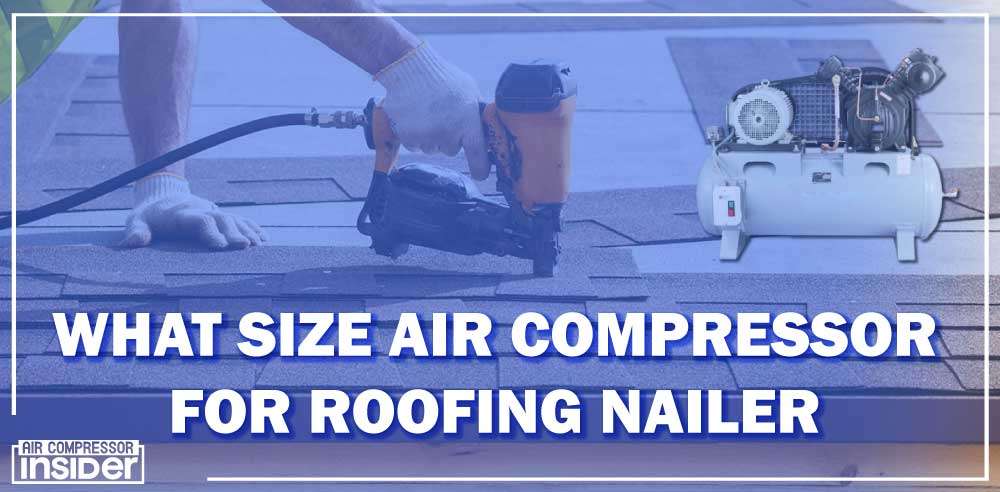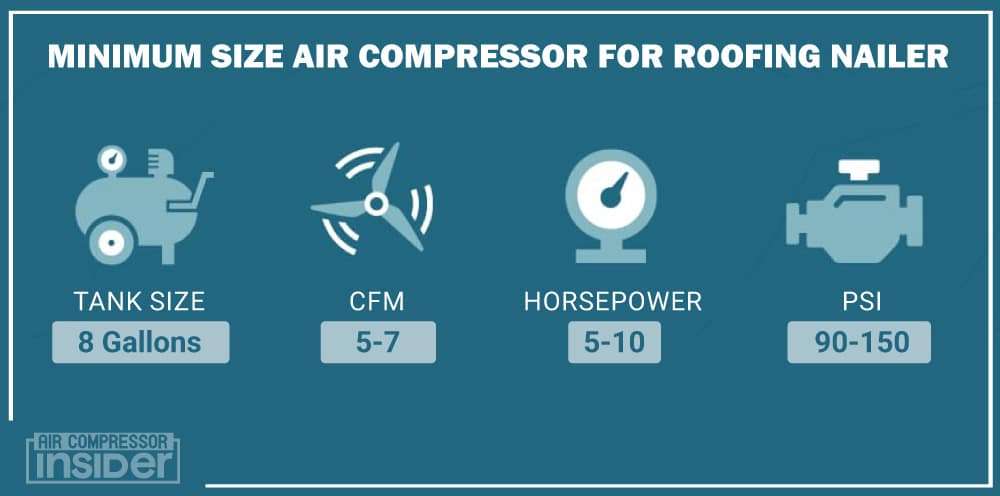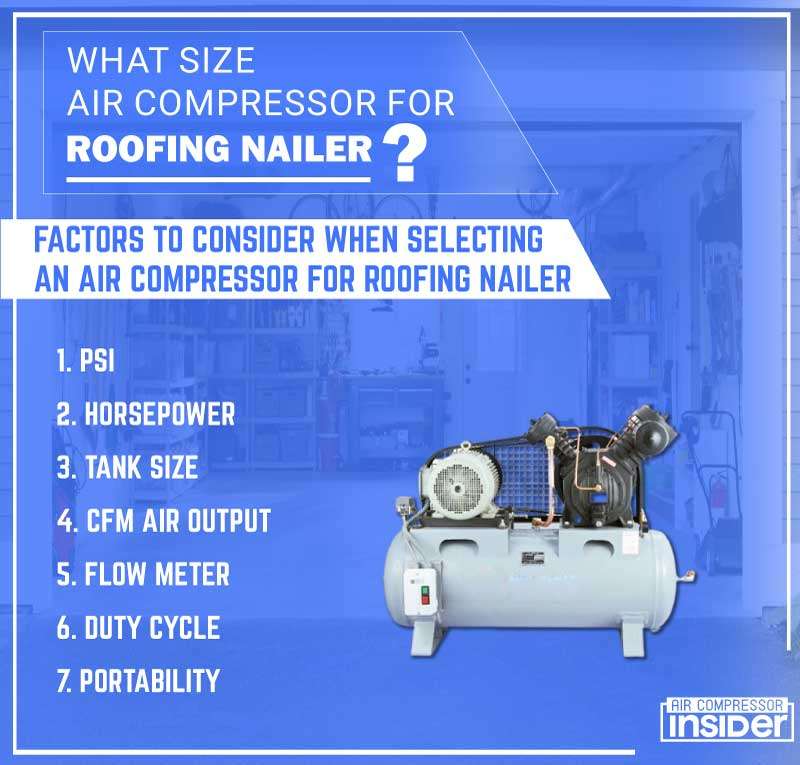If you are looking to get the most out of your roofing nail gun, then nothing will impact its performance more than the size of air compressor that is powering it. Using the wrong size air compressor when you’re doing home renovations or roofing repairs can be a costly mistake.
Whether it’s an accidental overload on your device or simply needing too much airflow to power a roofing nailer, knowing what size air compressor for roofing nailer is essential.
Ensuring you have a quality air compressor with an adequate volume and control over pressure can help ensure your roofing nailer runs smoothly and efficiently job after job.
What Size Air Compressor For Roofing Nailer

- What Size Air Compressor For Roofing Nailer
- What Is A Roofing Nailer?
- Types Of Roofing Nailer:
- Air Compressor For Roofing Nailer:
- 7 Important Factors to Consider When Selecting an Air Compressor for Roofing Nailer:
- 1. PSI Rate:
- 2. Horse Power:
- 3. Tank Size:
- 4. CFM Air Output:
- 5. Flow Meter:
- 6. Duty Cycle:
- 7. Portability:
- Pressure Requirement for Roofing Nailer:
- Horsepower Requirement for Roofing Nailer:
- Tank Size Requirement for Roofing Nailer:
- CFM Requirement for Roofing Nailer:
- Flow Meter Requirement for Roofing Nailer:
- Duty Cycle Requirement for Roofing Nailer:
- Portability Requirement for Roofing Nailer:
- Do You Need An Compressor For A Roofing Nailer?
- Frequently Asked Questions
- Conclusion:
For roofing nailer, you’ll need an air compressor with a CFM rating of at least 5-7 and a PSI rating of between 90-150. HP should be in the 5-10 range, and the gallon size should be around 8 gallons or higher.
Making an accurate air compressor choice seems like a complicated process, especially for big projects, such as roofing. Knowing what size of an air compressor for roofing nailer should be all about recognizing and meeting your needs, so you can make the most out of your project. To help you on your way to success in finding what size air compressor is best suited to fit a roofing nailer gun setup , we’ve prepared this comprehensive guide that covers all the ins and outs you need to know!
It’s important to take into consideration the size of your air compressor before using a roofing nailer. Generally, larger compressors can handle higher powered tools, while smaller models are more suited to lighter-duty tasks like trim work or stapling.

What Is A Roofing Nailer?
A roofing nailer is a specialized tool which allows you to securely attach shingle or tile overhangs, valleys and other surfaces quickly and easily. The air-powered device uses compressed air to drive nails into the material at an adjustable force. It’s a great choice for any homeowner looking to make quick work of their home renovations.
Types Of Roofing Nailer:
There are two main types of roofing nailers:
1- Pneumatic Roofing Nailer
2- Cordless Roofing Nailer
1- Pneumatic Roofing Nailer:
Pneumatic Roofing Nailers: These are the most popular type, as they require a compressor to operate. A standard air compressor will be able to power one of these devices effectively. They can handle tougher materials like composite shingles and slate tiles, but are heavier than other types of nailer.
2- Cordless Roofing Nailers:
These allow for greater portability and convenience when working on roofs with little access or overhead restrictions. You won’t need an air compressor to use one of these devices, as their batteries power them instead. However, they tend to be weaker than their pneumatic counterparts and are not suitable for attaching hard-to-handle materials.
Air Compressor For Roofing Nailer:
The size of the air compressor you need depends on the type of roofing nailer you own. Generally, a standard 6 gallon air compressor with a 4.5CFM at 90PSI should be enough to power most pneumatic roofing nailers and cordless models alike.
If you have a large-format pneumatic roofing nailer, then you may need something more powerful than this. Look for an air compressor that can deliver 7 CFM or higher at 90 PSI. Also bear in mind that any compressor you use should have a tank size of at least 10 gallons so that it can provide the necessary amount of air for your projects.
7 Important Factors to Consider When Selecting an Air Compressor for Roofing Nailer:

When choosing an air compressor for roofing, there are a few key features to look out for. These include the PSI, HP, tank size, CFM and flow meter needed to ensure the best performance of your device.
1. PSI Rate:
The pounds per square inch (PSI) of pressure is one of the most important factors when it comes to selecting an air compressor for your roofing nailer. This value measures how much force is produced by the device, and it should be at least 90 PSI for optimal performance of your nailer.
2. Horse Power:
The horsepower (HP) is another key factor to consider when choosing an air compressor as it affects the amount of air produced by the device. Generally, most roofing nailers will require an air compressor with at least 5HP for effective performance.
3. Tank Size:
The tank size of your air compressor should be able to handle the duration of your project. A larger tank gives you more available compressed air, which can be useful if you’re dealing with larger projects or working on multiple roofs in a day. Look for a tank that is at least 10 gallons in size to ensure you have enough power for any job.
4. CFM Air Output:
Cubic feet per minute (CFM) measures how much volume of air the device can deliver and is important when selecting an air compressor for roofing nailer use. Make sure to look for an air compressor with at least 4.5CFM for standard projects, and 7 CFM for larger-format pneumatic nailers.
5. Flow Meter:
A flow meter is a device that measures the rate at which air is flowing out of your compressor and into your roofing nailer. It’s important to ensure you have the right size flow meter because it can affect the performance of your device. Look for one that corresponds with the CFM rating of your compressor.
6. Duty Cycle:
The duty cycle measures how frequently you can use your device in a given period of time without overheating or damaging it. Make sure to select an air compressor with at least 50% duty cycle so that you can get maximum performance out of your roofing nailer.
7. Portability:
Depending on the type of roofing you are working with, you may need to move around a lot during a project. If this is the case, then look for an air compressor that is lightweight and has wheels so you can easily move it around without compromising performance.
By taking into consideration all of these key factors when selecting an air compressor for roofing nailer use, you will be sure to get peak performance from your device while also avoiding costly repairs in the future.
Now let’s discuss these 7 factors one by one in detail.
Pressure Requirement for Roofing Nailer:
If you are looking to get the most out of your roofing nailer, then it is important to consider the pressure requirement. The pounds per square inch (PSI) is the measure of force that the air compressor provides and should be at least 90 PSI for optimal performance.
Horsepower Requirement for Roofing Nailer:
The horsepower (HP) of the air compressor is another key factor to consider before making a purchase. A higher HP means that more air can be produced by the device, which makes it suitable for larger projects and multiple roof installations in one day. Look for an air compressor with at least 5HP for effective performance.
Tank Size Requirement for Roofing Nailer:
The size of the tank is yet another important factor to consider when choosing an air compressor. The larger the tank, the more available compressed air it can hold and provide to your roofing nailer. A 10-gallon tank should be sufficient for most projects, but you may need a bigger one depending on the size of job you’re doing.
CFM Requirement for Roofing Nailer:
The CFM rating indicates how much volume of air is produced by the device and needs to match with what your roofing nailer requires for optimal performance. Generally, 4.5 CFM is enough for standard pneumatic nailers, however for larger format devices you should look for at least 7 CFM.
Flow Meter Requirement for Roofing Nailer:
A flow meter measures the rate of air flowing from your compressor to the roofing nailer and is an important component when it comes to selecting a device that is suitable for the job. Make sure to purchase a flow meter that matches with the CFM rating of your air compressor.
Duty Cycle Requirement for Roofing Nailer:
The duty cycle is a measure of how frequently you can use your air compressor without it overheating or breaking down. Look for one with at least 50% duty cycle so that you can get maximum performance out of your roofing nailer.
Portability Requirement for Roofing Nailer:
Finally, you should consider portability when selecting an air compressor for your home renovation or repair project. If you need to move around constantly during the job, then look for a device that is lightweight and easy to transport with wheels or handles.
Do You Need An Compressor For A Roofing Nailer?
The answer is yes. An air compressor is essential for powering a roofing nailer and ensuring peak performance while avoiding costly repairs in the future. When selecting an air compressor, make sure to take into consideration all of the key factors such as pressure requirement, horsepower rating, tank size, CFM rating, flow meter requirement, duty cycle and portability so that you can get the most out of your device.
Frequently Asked Questions
Question #1
What is the pressure requirement for a roofing nailer?
The pounds per square inch (PSI) should be at least 90 PSI for optimal performance.
Question #2
What is the horsepower requirement for a roofing nailer?
Look for an air compressor with at least 5HP for effective performance.
Question #3
What is the tank size requirement for a roofing nailer?
A 10-gallon tank should be sufficient for most projects, but you may need a bigger one depending on the size of job you’re doing.
Question #4
What are the cubic feet per minute (CFM) requirements for a roofing nailer?
Generally, 4.5 CFM is enough for standard pneumatic nailers, however for larger format devices you should look for at least 7 CFM.
Question #5
Do I need to purchase a flow meter for my roofing nailer?
Yes, it is important to purchase a flow meter that matches with the CFM rating of your air compressor.
Question #6
What is the duty cycle requirement for a roofing nailer?
Look for an air compressor with at least 50% duty cycle to get maximum performance out of your roofing nailer.
Question #7
Is portability important when selecting an air compressor for my roofing nailer?
Yes, if you need to move around constantly during the job, then look for a device that is lightweight and easy to transport with wheels or handles.
Question #8
Do I need an air compressor for a roofing nailer?
Yes, an air compressor is essential for powering a roofing nailer and ensuring peak performance while avoiding costly repairs in the future.
Question #9
What factors should I consider when selecting an air compressor for my roofing nailer?
Make sure to take into consideration all of the key factors such as pressure requirement, horsepower rating, tank size, CFM rating, flow meter requirement, duty cycle and portability so that you can get the most out of your device.
Question #10
Is there anything else I should keep in mind when selecting an air compressor for my roofing nailer?
Yes, make sure to read reviews and compare different models before making a final decision on which one is best suited to your needs. You also need to ensure that you’re following safety guidelines when operating the air compressor. Lastly, it is important to keep your device well maintained and inspected regularly to ensure optimal performance.
Conclusion:
It is very important to know what size air compressor for roofing nailer. Make sure to consider all the key factors such as pressure requirement, horsepower rating, tank size, CFM rating, flow meter requirement, duty cycle and portability so that you can get the most out of your device. Read reviews and compare different models before making a final decision on which one is best suited to your needs. Lastly, be sure to follow safety guidelines when operating the air compressor and keep it well maintained and inspected regularly for optimal performance.
